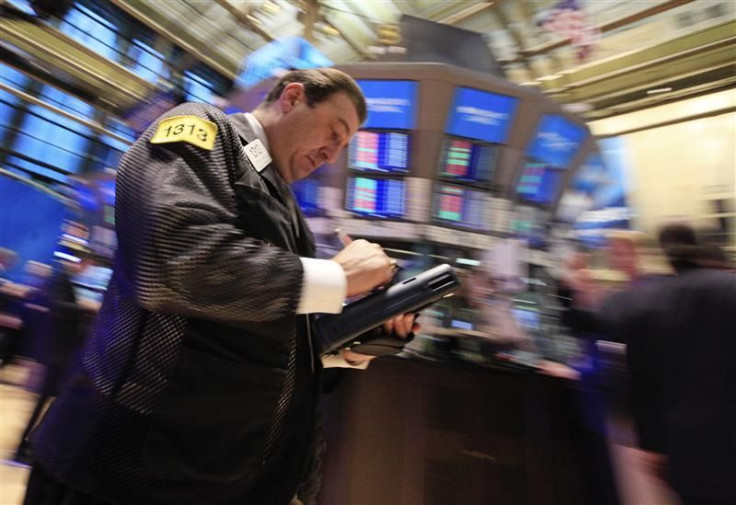U.S. Stocks Pull Back from Gains; Fed Hurts Dollar

(Reuters) -- U.S. stocks sagged on Thursday as traders cashed in on red-hot bank and technology shares, while the Federal Reserve's commitment to easy money to help the U.S. economy rebound weakened the dollar.
The statement by the Fed, which announced on Wednesday it would probably keep interest rates near zero until at least late 2014 - some 18 months later than the Fed had suggested last year - intensified buying of medium- and long-term U.S. government debt. The yield on five-year U.S. notes hit 0.7538 percent, a low going back at least 50 years.
The pullback in bank and tech shares, which have posted double-digit percentage gains so far in January, emerged after a disappointing report on new home sales. Housing-related stocks were among the biggest losers.
The sell-off raised concerns that the stock market rally in early 2012 might be running out of steam.
This market is tired and overbought, and we're seeing the
results of that today, said Larry McMillan, president of McMillan Analysis Corp.
But the housing data did not entirely wipe out investor optimism in the wake of the Fed's pledge to keep U.S. interest rates low for an extended period.
All in all, it does seem like a little bit of profit-taking on the weak housing data, but we've had a good run, and maybe it's simply time for a little bit of consolidation, said Ryan Detrick, senior technical strategist at Schaeffer's Investment Research in Cincinnati. We don't think it's a major peak, just a little bit of a break here.
U.S. stocks' declines were also fuelled by some earnings that fell short of investors' expectations.
But Caterpillar Inc, a Dow component, posted a jump in quarterly earnings that far exceeded Wall Street's forecasts.
As stocks slipped further, U.S. crude oil and gold futures extended gains for a second day although they came off session highs.
Nagging worries about whether Greece will be able to craft a debt-swap deal and avoid a messy default also prompted investors to rush to buy safe-haven U.S. and German government debt.
Greek media reported that Greece's private creditors were willing to lower their final offer of a 4 percent interest rate on new Greek bonds in order to clinch a deal in time to avert an unruly default. The debt-swap talks will continue on Friday.
The Fed's extended low-rate vow and Fed Chairman Ben Bernanke's suggestion that the central bank is ready to provide more stimulus if the economy deteriorates come at a time when recent data have signalled a strengthening U.S. economy.
New orders for U.S. durable goods - manufactured products ranging from toasters to aircraft that are meant to last three years or more - rose more than expected in December. Underlying trends continued to point to improving labour market conditions even as new claims for U.S. unemployment benefits rose last week.
New home sales, however, fell 2.2 percent in December. Economists had expected a modest increase.
The Dow Jones industrial average .DJI closed down 22.33 points, or 0.18 percent, at 12,734.63. The Standard & Poor's 500 Index .SPX finished down 7.60 points, or 0.57 percent, at 1,318.45. The Nasdaq Composite Index .IXIC ended down 13.03 points, or 0.46 percent, at 2,805.28.
The benchmark 10-year U.S. Treasury note, buoyed by the Fed's statement, shot up 17/32 in price to 100-17/32, offering a 1.94 percent yield, down 6 basis points.
The FTSEurofirst 300 .FTEU3 index of leading European shares rose 1.2 percent to end at 1,051.72 after touching a six-month high. But Tokyo's Nikkei index .N225 slipped 0.4 percent to close at 8,849.47.
The MSCI world equity index .MIWD00000PUS trimmed gains due to the pullback by U.S. stocks. It finished up 0.6 percent -- less than half its earlier gain of 1.35 percent to a session high of 320.69.
The Fed's pledge to keep rock-bottom rates undermined the U.S. dollar, as traders sought higher-yielding currencies.
The dollar index .DXY, which measures the greenback against a basket of other currencies, dipped 0.19 percent to 79.429 after touching a level near a five-week low.
The euro hit a session peak of $1.3175, its highest since December 21, and was last trading flat on the day at $1.3102. It has rallied from around $1.2980 before the Fed statement on Wednesday.
In the oil market, front-month Brent crude futures rose 98 cents, or 0.89 percent, to settle at $110.79 a barrel.
U.S. crude futures for March delivery settled at $99.70 a barrel, up 30 cents, or 0.30 percent, after earlier touching a session high at $101.39.
Spot gold was last up 0.6 percent at $1,720.69 an ounce after hitting a peak of $1,729.76, the highest since December 8.
© Copyright Thomson Reuters 2024. All rights reserved.




















